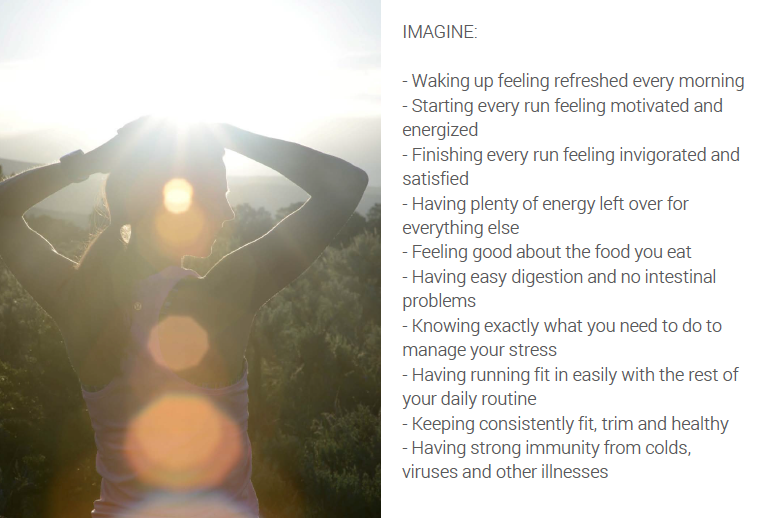After successfully completing Colorado’s infamous Leadville Trail 100 several years ago, I was on cloud nine, dreaming about my next big endurance challenge. While my imagination soared, my body plummeted into depths of exhaustion I’d never before experienced.
I couldn’t seem to recover from Leadville, and almost a year after the race was over, I still struggled to run for even an hour, and soon even that energy dried up. I was exhausted all the time, barely making it through the workweek so I could spend weekends in bed. Sleepless, lethargic and starting to feel depressed, I knew something was seriously wrong, and that I didn’t want to treat with a prescription.
Seeking solutions, I delved deeply into studying what it true health looks like and what factors most greatly influences our well-being.
What I learned changed the way I view running forever.
It turns out that the body’s response to exercise-induced stress and emotional stress is the exact same. In both cases, the adrenals release the stress hormone, cortisol, along with other biochemicals that trigger a cascade of physiological changes designed to prepare us for action.
I had always thought of running = good, and stress = bad. However, running is in fact a type of stress that can be good or bad.
Good stress usually lasts for a short time (say, the duration of your run) and leads to physiological adaptations that makes us stronger, fitter, faster. Even a certain amount of mental stress (such as learning a new technical skill or language) helps the brain grow new neural pathways.
Bad stress is typically chronic (such a demanding, nonfulfilling job) and makes us more tired, ruins our sleep, causes inflammation, lowers immunity and impedes healing.
The state I had reached a year after Leadville—and in fact, where many runners find themselves—is where running had become a bad stress. How?
My total stress load was so great that running was only adding to my already-depleted state.
So, armed with this new awareness, what was the solution?
Running Mindfully
The first step was to get familiar with the ebb and flow of my daily stress load and how it affected my health, mood and–most importantly–running performance. In a training log, I marked down my sleep quality, my diet, motivation level, emotional stress as well as my running workouts. The log gave me the context I needed to see how my training quality decreased in relation to my overall stress load, and how, when my stress decreased, my running was much better.
Then I embarked on a proactive plan to reduce my total stress load. Sure, I had a full life with a busy career in marketing, a family to care for and side projects and other commitments, but my life wasn’t necessarily more stress-filled that other people’s.
But I was lousy at managing the stress I did have. And that had change.
I began with improving my sleep habits. From painting my bedroom blue (purportedly the best color for sleep) to going to bed at the same time every night to ending the day with restorative yoga poses, I implemented several new habits that have been proven most effective for supporting slumber.
Then I looked at how I was eating. While I focused a lot on fueling with the right amount of protein, carbs and healthy fats, I wasn’t really considering the nutrient density of what I ate, especially post-workout. That realization triggered a major shift to prioritizing unprocessed whole foods rich in nutrients, such as vegetables, fruit and whole grains. Cutting out the sugar and reducing my caffeine consumption also helped to lower inflammation and better recovery.
I was starting to see my energy return, but I wanted to feel even better.
Then I learned about the power of mindfulness for lowering cortisol (the hormone most associated with stress), improving sleep, mental clarity and speeding healing.
I was especially influenced by a study done with psoriasis patients. Psoriasis is an auto-immune disease that causes large, red, itchy scales to spread across any and all body parts. As a psoriasis sufferer for 20 years, I was astounded to read about the study in which the patients who meditated while undergoing UV light therapy experienced skin clearing that four times better than those who received only the UV light therapy and didn’t meditate. And countless other studies also document the power of the mind on healing the body.
What does that have to do with running?
Running is a kind of stress from which the body must heal. And the processes that heal a chronic disease are the same ones involved with post-workout recovery. When you’re too tired, overwhelmed with stress, under-nourished or in any other way compromised, these processes don’t work well. So when recovery isn’t happening, chronic injury, burnout and other symptoms of “overtraining” set in.
Mindfulness is a powerful and easy tool that runners can to use to improve recovery, reduce chronic inflammation and rebalance hormones. And the best part is that it takes only a relaxing 10 minutes a day.
The final key to making running a sustainable part of my life was to take a more mindful approach to training overall. Rather than letting my training plan and expectations of how I “should” be preparing for a race dictate my workouts, I made it a practice to tune in to my body’s signals. My motivation level, enthusiasm and energy levels now set the tone for the week’s workouts.
•••
Join Elinor Fish for the four-day Moab Mindful Running Retreat for women taking place in Moab, Utah, October 15-18, 2015. Contact her at elinor@elinorfish.com or find more information at http://elinorfish.com/events-and-appearances/moab-mindful-running-retreat
Elinor Fish is a writer, coach, ultrarunner and expert in mindful running and natural running form. She is dedicated to helping people improve their health and reduce stress through a sustainable running practice. Elinor’s articles and ideas have been featured in Runner’s World, Los Angeles Times, Yoga Journal, SHAPE, Women, Endurance, Trail Runner, Running Times and many others.
To receive Elinor’s free ebook on healthy running, go here: http://elinorfish.com/product/the-healthy-runners-manifesto-e-book/



